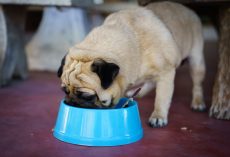Depending on your dog's breed, every dog eats differently. Some may inhale their food and want to eat more and more whereas others are completely satisfied after their first meal. Why does your dog act the way he does when he's eating?
Some dogs may even become obese from eating too much. In fact, we will get into what we can do about Rover’s weight gain later but if you are wondering what causes it, other than a lack of exercise and grain-heavy kibble, please read below.
The following comes from Dr Becker from Healthy Pets:
Researchers Uncover First Canine ‘Obesity Gene' in Labs
Researchers from the University of Cambridge tested a group of Labrador retrievers for three genes related to obesity in mice and humans. The obese Labradors were more likely to have a variation in a gene known as POMC. Specifically, a portion of the DNA at the end of the gene was missing.
They noted, “The deletion disrupts the β-MSH and β-endorphin coding sequences,” which are associated with body weight and food motivation. It's thought the missing part of the POMC gene may help switch off feelings of hunger after a dog has eaten.
After analyzing DNA from 38 other dog breeds, the gene variant was only found in one other: flat-coat retrievers, which are closely related to Labradors.
It's also seen more often in Labrador retrievers selected to become assistance dogs. This could be because the dogs' increased food motivation makes them easier to train using treats. Not all Labradors carry the genetic variation; it's estimated that more than one-fifth do, however.
Dogs with one copy of the genetic variant were about 4 pounds (lb) heavier on average than dogs without, while those with two copies weighed close to 8.5 lb more, on average.
Obesity Gene May Have Benefitted Labradors' Ancestors
Labradors and flat-coat retrievers came from a common ancestor, the now-extinct St. John's water dog. These working dogs were used by fishermen in Newfoundland to retrieve nets from the cold water.Having a genetic variant that encouraged increased calorie consumption could have significantly benefitted these dogs. Study co-author Eleanor Raffan, Ph.D., from the University of Cambridge, told the Guardian: “In that context, when you are doing really hard work and having to burn a lot of calories to stay warm, snaffling any food in sight might have been a really good idea.”
It's possible, according to the researchers, that the food-motivated dogs may have been easier to train and therefore favored by their owners, allowing the gene to get passed down generation after generation.
Genetic Factors Are Only One Part of the Picture
While it seems likely that some Labrador retrievers may be hard-wired to gorge themselves on food and treats if given the opportunity, genetic factors are not the sole driving force behind a dog's weight.Even in the case of the newfound obesity gene, not all Labradors have it, nor are all Labradors that do overweight. Raffan continued in the Guardian:
“Within our cohort we have overweight dogs without the mutation, we have very food motivated dogs without the mutation and equally we have dogs with the mutation who are lean because their owners keep them very well managed.”
That latter sentiment is key, as ultimately it's up to you, the owner, to help your dog manage her weight. Even though Labrador retrievers have the highest rate of obesity and are more food-obsessed than many other breeds, this doesn't mean your dog is destined to become the next obesity statistic.
Understanding the factors that cause potential weight gain is one thing but you may be wondering what an adopted doggy parent should do for a dog who's prone to weight gain. Most experts would recommend a nutritionally balanced fresh-food diet, preferably homemade.
To read more on this very important health topic please go to Healthy Pets. There you will learn what important ingredients should be in your best friends dog food bowl to keep him at a good weight and satisfied!









